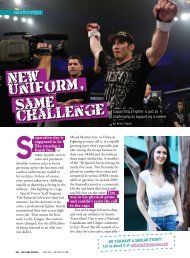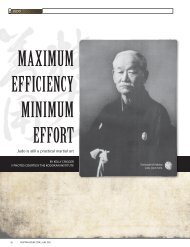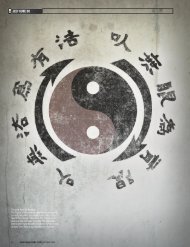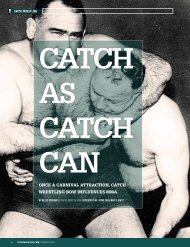Voodoo Mojo Juju Magic - Kelly Crigger
Voodoo Mojo Juju Magic - Kelly Crigger
Voodoo Mojo Juju Magic - Kelly Crigger
You also want an ePaper? Increase the reach of your titles
YUMPU automatically turns print PDFs into web optimized ePapers that Google loves.
B y K e l l y C r i g g e r<br />
I l l u s t r a t i o n s b y E s t h e r B u n n i n g<br />
VOODOO<br />
MOJO<br />
MAGIC<br />
In the winner-take-all<br />
world of MMA,<br />
some fighters feel they<br />
bring an extra edge<br />
to their game by being<br />
VERY<br />
SUPERSTITIOUS.<br />
JUJU<br />
For the past several years,<br />
Andre Vinicius “Benkie” Aurnheimer, the strength and conditioning<br />
coach of American Top Team, has fired up a cigar after<br />
a Jeff Monson fight. Like many of the fighters he coaches,<br />
54<br />
Benkie is a firm believer in the power and practice of superstition.<br />
His takes the form of buying a premium cigar each time<br />
an ATT fighter steps into the ring, showing it to the fighter,<br />
then stowing it in his pocket. If the fighter wins, Benkie<br />
R E A L F I G H T E R M A G . C O M<br />
smokes half for himself and half for the gods to ensure that the<br />
fight’s good energy carries over to the next one. Should the<br />
fighter get his head handed to him, Benkie snaps the cigar in<br />
half and throws it away.
lack cats. “Growing up in Brazil, everyone said they’re<br />
bad luck, so I always avoided them and still do,” he<br />
says. Pride fighter Quinton Jackson is wary of his signature<br />
chain getting tainted before a fight. “I don’t like to<br />
wear it if it has touched the ground. I’ve done it, but I<br />
didn’t like it.” Dean “The Boogeyman” Lister believes<br />
heavily in the possibility of his words coming back to<br />
bite him. “I never say what I’m going to do to an opponent,<br />
like ‘I’m going to put an ass whooping on him big<br />
time,’ because that invites failure. I always just say,<br />
‘We’ll see.’”<br />
A SUPERSTITION IS THE IRRATIONAL<br />
belief that future events are influenced by specific<br />
behaviors, without having a causal relationship.<br />
Superstitions are based on general, culturally variable<br />
beliefs in a supernatural reality. Many common superstitions<br />
have their basis in religion. Spells, curses,<br />
voodoo and animal sacrifice all stem from a basic fear<br />
of an unknown higher power and a desire not to anger<br />
it. Historical events also become transmuted into<br />
modern-day myths. The belief that Friday the 13th<br />
bodes evil dates back to October 13, 1307, when the<br />
Grand Master of the Knights Templars Jacques<br />
DeMolay was arrested for church heresy; seven years<br />
later he was burned at the stake.<br />
From the earliest days of armed conflict, opposing<br />
forces have embraced superstitions to secure victory.<br />
Roman legionnaires feared that the loss of their most<br />
prized possession, a banner depicting a golden eagle,<br />
Many superstitions have their basis in religion.<br />
Spells, curses, voodoo and animal sacrifice all<br />
stem from a basic fear of an unknown higher power<br />
and a desire not to anger it.<br />
courting karma<br />
reality check<br />
While numerous fighters believe in the power of the<br />
unknown, many have no faith at all in rituals, traditions or<br />
luck, and rely solely on hard training and their own skill to<br />
win the day. Dan Henderson, Rashad Evans, Urijah Faber,<br />
Ivan Salaverry, Jeremy Horn and Frank Trigg are a few who<br />
don’t believe that intangible forces influence their game.<br />
Pride fighter Josh Barnett also eschews superstition, but<br />
says, “I believe in the energy of the people around you, and<br />
I think it carries over into a fight. If you have people in your<br />
corner who believe in you, then that positive energy will be<br />
with you in the ring.”<br />
“It’s an association of something an athlete did just<br />
before a good performance that gets reinforced intermittently.<br />
It doesn’t have to work every time, just<br />
enough to keep him believing in the cause and effect<br />
of the event.”<br />
Superstitions abound in combat sports. The<br />
ancient art of Japanese sumo is saturated with tradition,<br />
especially concerning the ring-entrance ritual.<br />
Of the two dominant styles, Unryu (defensive) and<br />
Shiranui (offensive), it is believed that yokozunas<br />
(grand masters) who use the Shiranui style do not<br />
last long, a superstition promulgated by the losing<br />
record of wrestlers who’ve adopted it.<br />
The Ram Muay, a lengthy dance involving a series<br />
of movements performed to music before every Muay<br />
Thai match, is believed to protect the fighter and lead<br />
him to victory. During the dance, the fighter determines<br />
in which nostril his breath is flowing more<br />
freely. Then he takes his first step over a stair with the<br />
foot of that side for good luck. He also pays homage<br />
to his trainer and school, aspiring to make his dance<br />
unique and cleanse the ring of ill-natured spirits.<br />
Having started out as a Muay Thai boxer, Kit Cope<br />
carries its rituals into the MMA ring. Cope insists on<br />
stepping over the top ring rope instead of going<br />
through them because he believes his energy is<br />
stored predominantly in his head, and stepping<br />
through the ring ropes may cause it to wash off.<br />
“I also don’t take too many chances leading up to<br />
a fight,” he admits. “Even if it’s as simple as a video<br />
game, I don’t want to lose at anything because I<br />
don’t want to carry failure into the ring.”<br />
“Superstitions, at the heart, are emotionally stabilizing,”<br />
agrees Lustberg. “They provide confidence;<br />
they provide assurance. They help an athlete get into<br />
his game mentally.”<br />
ARGUABLY THE KINGS OF ODDBALL ATHLETES<br />
are baseball players, probably because the game has<br />
so much downtime built into it and the season lasts so<br />
long, giving players plenty of time to worship in the<br />
voodoo church of unexplainable phenomena. In a<br />
2005 CBC Sports Online poll, seven of the top 10 most<br />
superstitious athletes of all time came from MLB,<br />
including champion ritualist Wade Boggs.<br />
For home games, the Hall of Famer left his house at<br />
exactly 1:47 p.m., took exactly 150 balls for infield<br />
practice at 4:37, entered the batting cage at 5:17, and<br />
ran wind sprints at 7:17. Before each at bat, he wrote<br />
the Hebrew word Chai (meaning life) into the dirt of<br />
the batter’s box. In the field, Boggs always found three<br />
rocks or pebbles and tossed them away. Between<br />
56<br />
R E A L F I G H T E R M A G . C O M<br />
ATHLETES, EVEN MORE THAN CIGARsmoking<br />
coaches, will do whatever it takes to get into<br />
the winner’s circle, no matter how quirky they may<br />
seem in getting there. The point where sport and<br />
superstition collide can be a twilight zone of personality,<br />
paranoia and neurosis. Former Detroit Tigers<br />
pitcher Mark Fidrych talked to the baseball before<br />
facing batters. Former Ottawa Senators forward<br />
Bruce Gardiner dipped his hockey stick into a<br />
toilet before hitting the ice. And Jacksonville Jaguars<br />
defensive tackle John Henderson—all 6-foot-7, 325<br />
pounds of him—gets his face slapped by a ballsy<br />
assistant trainer before each game.<br />
The MMA world is in no way immune to such rituals.<br />
ATT standout Wilson Gouveia shies away from<br />
could lead to the entire legion being disbanded.<br />
American Indian tribes inundated their warriors with<br />
a shaman’s blessing before entering battle, and<br />
Japanese samurai were required to perform a laundry<br />
list of pre- and post-battle rituals.<br />
And for many of today’s MMA fighters, popular<br />
superstitions such as walking under a ladder, breaking<br />
a mirror and the fear of the number 13 are believed to<br />
affect the outcome of a match more than skill or the<br />
law of averages.<br />
“An athlete’s superstitions are almost always<br />
derived from a positive connection between an event<br />
and a win,” says Richard Lustberg, PhD, a noted New<br />
York sports psychologist who has worked with professional<br />
and amateur athletes for more than 17 years.<br />
SOME ATHLETES AND FANS FROM OTHER SPORTS MAKE THE RITUALS OF MMA FIGHTERS LOOK POSITIVELY<br />
SANE AND SCIENTIFIC. HERE ARE JUST A FEW HIGHLIGHTS FROM THE WEIRD WORLD OF SPORTS.<br />
During the 1952 NHL playoffs,<br />
brothers Pete and Jerry Cusimano<br />
lobbed an eight-legged cephalopod<br />
onto the ice at Detroit’s Olympia<br />
Stadium. Each tentacle of the octopus<br />
was symbolic of a win in the<br />
playoffs. At the time, the NHL<br />
boasted only six teams, and eight<br />
victories (two best-of-seven series)<br />
were needed to win the Stanley<br />
Cup. The Red Wings swept the<br />
series that year, and the octopus<br />
has remained the team’s good-luck<br />
charm ever since.<br />
Raymond Domenech, coach of<br />
the French soccer team that made it<br />
to the 2006 World Cup finals, reads<br />
tarot cards to learn about players’<br />
personalities, is wary of having too<br />
many Leos on his team and doesn’t<br />
like Scorpios on the field at all. But he<br />
may want to rethink his astrology:<br />
His team lost in the finals without<br />
talented Scorpio Robert Pires.<br />
One of the most superstitious<br />
groups of sportsmen on the planet<br />
are fishermen, who follow a liturgy<br />
of rites to ensure that fish stay interested<br />
in their lures. On the Water<br />
magazine publisher Chris Megan<br />
admits to a few. “I can’t stand catching<br />
a fish on first cast and can never<br />
have any new clothes on. I can’t<br />
crack a beer until I have landed my<br />
first fish or at least six hours have<br />
gone by with no luck. Then I have to<br />
break the curse that has been put on<br />
our boat by cracking a beer.”<br />
57<br />
R E A L F I G H T E R M A G . C O M
“What I really hated was<br />
being touched,” says<br />
Taktarov.<br />
“I even slapped<br />
a guy once for touching<br />
me before a fight.”<br />
to communicate with. My rituals remind me that I’m<br />
just a speck of sand in the universe.”<br />
“Ultimate Fighter, Season 2” alum Keith Jardine<br />
has a different take on superstition. “I was born on<br />
Halloween, so I always grew up thinking the traditional<br />
bad-luck omens that scared other people were<br />
actually good luck for me. I embrace those things<br />
instead of being scared by them.”<br />
58<br />
R E A L F I G H T E R M A G . C O M<br />
pitches, he had a habit of swiping the dirt in front of<br />
him with his left foot, tapping his glove two or three<br />
times and adjusting his cap. He also ate chicken on<br />
every game day.<br />
So who’s the Wade Boggs of MMA Oleg Taktarov.<br />
The winner of UFC 6 followed a litany of superstitions<br />
before entering the Octagon. “I would refrain from<br />
having sex and stay away from smokers for three<br />
weeks before a fight,” admits The Russian Bear. “I had<br />
to watch ‘Rambo’ for good luck, I had a complicated<br />
way of tying my sambo belt, and before each fight I<br />
would walk outside, look to the sky and admit something<br />
personal for good energy. But what I really<br />
hated was being touched. I even slapped a guy once<br />
for touching me before a fight.”<br />
Even outside the fighting arena, Taktarov follows<br />
strict guidelines to ward off negative energy. “If I’m<br />
driving down the freeway and see something horrible,<br />
like an accident, I tap my left shoulder three times,”<br />
he says. What’s at the heart of Taktarov’s superstitions<br />
“I feel there’s a higher energy that everyone has<br />
ALTHOUGH ROUTINES ARE GEARED<br />
toward the same goals as superstitions, the two<br />
should not be confused. Breaking a routine can throw<br />
a fighter off, but usually isn’t enough to tempt intervention<br />
by irate sports gods. Since as far back as he<br />
can remember, Dennis Hallman executes a side-toside<br />
stretch before each fight. “I don’t know why, but<br />
I always do it.”<br />
“At the heart of everything an athlete does is comfort,”<br />
says Lustberg. “A routine, a superstition, a<br />
favorite piece of equipment all lead to getting into the<br />
comfort zone mentally.”<br />
While other fighters change their gear regularly,<br />
Randy Couture admits he kept the same equipment all<br />
through his years as a wrestler. “I had the same plastics<br />
to cut weight in all through college—the same<br />
headgear, cup, everything. I always went through the<br />
same warm-up routine to get my heart rate up. It was<br />
just a comfort level I liked to achieve before fighting.”<br />
Even the king of MMA superstitions had routines.<br />
“I never wore protective equipment. I never wore a<br />
mouthpiece or cup. I just felt that it got in the way,”<br />
admits Taktarov. The Nevada State Athletic<br />
Commission might want to have a word with you<br />
about that, Oleg.







